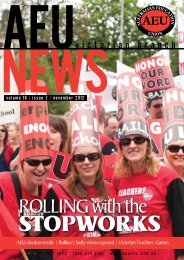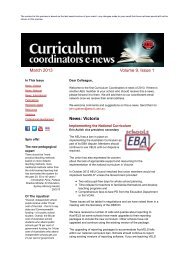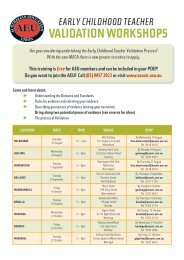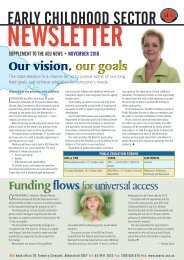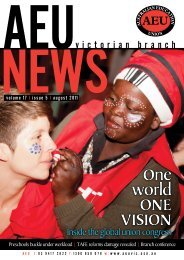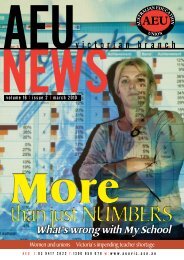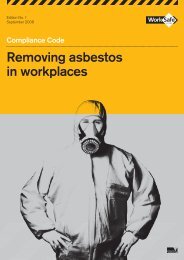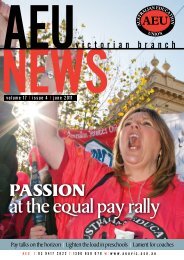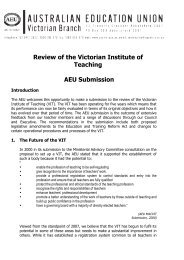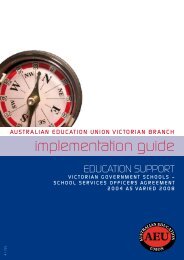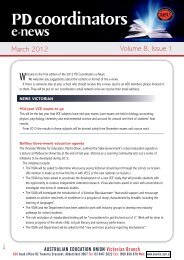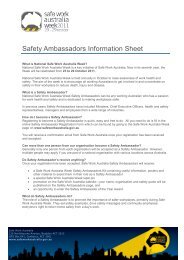taKinG a WHOle ScHOOl aPPrOacH tO cHanGe
taKinG a WHOle ScHOOl aPPrOacH tO cHanGe
taKinG a WHOle ScHOOl aPPrOacH tO cHanGe
Create successful ePaper yourself
Turn your PDF publications into a flip-book with our unique Google optimized e-Paper software.
TAKING A WHOLE<br />
SCHOOL APPROACH<br />
TO CHANGE<br />
Cleeland Secondary College:<br />
a case study<br />
rachel power<br />
Principal David Finnerty thanks columnist Andrew Bolt for prompting<br />
radical changes in his school. Bolt wrote that Cleeland Secondary College, one of the<br />
most multi-cultural in the state (87 languages at last count) and with a high influx of<br />
first-phase immigrants, was one of the state’s 23 failing schools.<br />
Finnerty set out to prove him wrong, making targeted use of funding to introduce a<br />
plethora of programs that have turned his school around in the past five years. Central<br />
to his strategy was building the capacity of his staff to meet the complex needs of<br />
Cleeland’s students.<br />
It was a decision that put social justice at the heart, not just of the curriculum<br />
and teaching methods, but of the school’s overall approach. Cleeland is committed to<br />
equity for all of its students, providing a context in which they are given opportunities<br />
to thrive regardless of their backgrounds. As the central means by which children and<br />
their families are integrated into the community, the college has also embraced its role<br />
in shaping broader community attitudes.<br />
Cleeland Secondary College is located in one of the most depressed urban communities<br />
on all indices in Australia. Refugees and first-phase immigrants make up a<br />
large proportion of the student intake, with traumatised children arriving from every<br />
war-torn point of the globe, including Eritrea, Sudan, Somalia and Palestine.<br />
29
30<br />
While Finnerty recognised his teachers’ dedication and their individual efforts to<br />
build relationships with students, he saw that conventional training was not sufficient<br />
in preparing them to meet the highly complex needs of Cleeland’s particular cohort.<br />
In a groundbreaking move, the school is supporting all interested staff members to<br />
undertake a Masters of Education degree at Monash University as part of a wholeschool<br />
approach to addressing student needs.<br />
Finnerty is also acting to have the particular contribution of schools such as<br />
Cleeland recognised by the state. As part of the ministerial taskforce on publication of<br />
VCE data, he has been instrumental in broadening a formerly narrow results-based set<br />
of criteria for assessing schools to a more holistic measurement of a school’s worth<br />
to its community. Cleeland builds its pupils’ confidence by celebrating every achievement,<br />
not just academic success, as a mark of how far the student has come.<br />
The first point of placement for new immigrants whose first language is not English<br />
is the Noble Park English Language Centre. It offers students a dedicated bridging program—usually<br />
for two terms, but extending to a year or longer if necessary. Schooling<br />
here is traditional, but with an emphasis on acquiring language and numeracy skills<br />
before transferring to the mainstream curriculum.<br />
Some of these children, such as recent arrivals from Sudan, have never attended<br />
school or lived in an urban community. They immediately commence an immersion<br />
program in literacy, numeracy and acculturation. “One of the first things we do,” says<br />
Finnerty, “is take the kids out and explain what a road is and why you don’t walk<br />
down it.”<br />
Each year between 40 and 100 kids transfer from the language centre into Cleeland<br />
Secondary College, representing a significant part of the school’s total population of<br />
approximately 600. Other sizeable groups include those excluded from other schools<br />
or transferring from the private sector because of behavioural issues or changed<br />
economic circumstances. Finnerty has a policy of never turning a child away.<br />
Assistant principal Sue Goodwin says the Masters degree was a response to feedback<br />
from staff that they wanted training to deal with the complex needs of students.<br />
The school covers its cost using equity funding. To Finnerty and Goodwin’s surprise,<br />
30 staff members enrolled.<br />
The course offers modified units within a traditional three-year Masters framework.<br />
A purpose-designed, coursework-based program, delivered at the school by Monash<br />
University lecturers, it focuses on language and literacy across the curriculum, with<br />
particular reference to the needs of refugee and ESL students. In this way, teachers<br />
focus on matters of direct relevance to their teaching practice.<br />
Monash has asked Finnerty to undertake a PhD tracking the changes at the<br />
college. The University is also evaluating the Masters program—associate professor<br />
Brenton Doecke sees it as “a wonderful opportunity to review traditional offerings”—<br />
and collaborating with Cleeland staff to develop a research project that will assess<br />
classroom practice and the subsequent value of the Masters to students.<br />
“There was a sense that traditional PD models wouldn’t serve (staff’s) needs,”<br />
Doecke says. “They all had an impressive amount of professional experience behind<br />
them, (but) they needed to be engaged in systematic and sustained inquiry to meet<br />
PROFESSIONAL VOICE ‐ Volume 4 Issue 3
Rachel power<br />
TAKING A WHOLE SCHOOL APPROACH TO CHANGE<br />
the needs of the school.” Sue Goodwin believes the validation of good practice offered<br />
by the program has encouraged staff to take risks. “The professional dialogue in the<br />
staffroom … is now at a whole different level.”<br />
The chance to work together and support each other through the Masters has<br />
been an important aspect of the teachers’ willingness to take it on. Mary-Anne Allen,<br />
a music teacher and SSO, says teachers traditionally work in isolation whereas the<br />
Masters was a catalyst for collaboration. “We’re sharing resources, data and ideas<br />
and that enhances what we’re doing in the classroom.”<br />
More important was the recognition that acknowledging issues related to students’<br />
backgrounds wasn’t enough; they needed to do something about them. A third of<br />
Cleeland’s students have been in Australia less than two years. Many are not living<br />
with family and most are in short-term emergency housing. Some do not know their<br />
birth date or even their age. As a result, says Goodwin, any sense of stability is really<br />
important to them.<br />
The school needs to take a holistic approach, connect people with the school<br />
community and be honest about the challenges these families face, she says.<br />
“Our role in the school is certainly about educating them and allowing them the<br />
opportunity to develop the skills to make them more productive citizens, but in order<br />
for us to deliver on that, we have to take into account all the other issues because we<br />
can’t move forward with the learning until we have the trust and the relationship.”<br />
Drawing on international expertise, the college has contracted US educator Dr<br />
George Otero seven days a year. Otero is co-founder of the Center for Relational<br />
Learning (CRL) in Santa Fe, a consultancy which assists schools and other organisations<br />
to open new avenues of learning and collaboration.<br />
Otero runs one full curriculum day and spends the other days in classrooms and<br />
staff meetings, working with teachers to build constructive relationships with students<br />
and each other. Staff have been so impressed that 16 of them paid $4000 each to<br />
attend a two-week immersion program at Otero’s Santa Fe centre. Teachers trialling<br />
the relational learning and emotional literacy ideas they brought back report a marked<br />
improvement in their students’ response.<br />
In addition to the Masters program, Cleeland is one of only two schools to offer<br />
a streamed ESL VCAL, specifically targeting the needs of students from the Horn of<br />
Africa. More radical moves have been the abolition of key learning areas, and the<br />
creation of curriculum team leaders and a professional learning team at each year<br />
level, responsible for curriculum design, delivery and implementation, and welfare<br />
and wellbeing.<br />
The school day is also now configured differently, with lessons extended from 48<br />
to 72 minutes, compelling teachers to offer greater variety. “They can’t chalk and talk<br />
for 72 minutes,” says Finnerty. Class sizes are kept to a minimum.<br />
The purpose is to treat each student as an individual. “Every child will respond<br />
differently to different learning stimuli,” Finnerty says. “Teachers must deal with the<br />
complexity of that and then put on the layer of language and access … to effectively<br />
engage our kids in [the] pedagogical process. What we are now doing is constantly<br />
within a lesson changing up what we are doing every ten or fifteen minutes.”<br />
EDUCTION & SOCIAL ACTION<br />
31
Other innovations include the Cleeland Learning Centre—Myuna—which houses<br />
an outplacement program for kids who have posed problems in mainstream settings,<br />
either for themselves or others. Finnerty has also been heavily involved in Operation<br />
Newstart, a 10-week program run in partnership with a wide range of government<br />
and non-government agencies including Youth Assist and the Department of Human<br />
Services. It uses wilderness therapies and other self-esteem-building activities to help<br />
kids critically at risk of becoming involved in crime. Myuna has a 40-45 per cent success<br />
rate; Newstart’s is even more impressive, with 97 per cent returning to school,<br />
further education or training, or getting a job, according to Finnerty. The school is also<br />
involved in the No Dole program, which prepares Year 10 students for employment<br />
or training.<br />
Fundamental to Cleeland’s philosophy is a focus on the “whole person”. The<br />
school develops a personal profile for each student, which celebrates all of their<br />
achievements, from holding down a part-time job, to being part of a sports team, to<br />
getting a D in English. (“Grade D for many kids is a (major) leap in their learning,”<br />
Finnerty says.) With national and state champions in a number of spheres, sport<br />
plays a key role in this.<br />
Sue Goodwin says that if students feel connected to their school they can explore<br />
other opportunities. “In essence it’s based on relationship,” she says. Cleeland staff<br />
“really get to know the kids, allowing them to feel comfortable and accepted and<br />
valued... Having worked in a large variety of schools, coming into this place I believe<br />
the sense of harmony and goodwill among the kids is remarkable.”<br />
In five years, the entire operation of the college has changed, with student learning<br />
outcomes firmly at the centre. In the Department of Education’s 2006 Attitudes<br />
to School Survey, morale among students at Cleeland scored in the top 2 per cent of<br />
schools in Victoria; school connectedness and student motivation were both in the<br />
top 3 per cent; while for learning confidence, Cleeland was in the top 1 per cent. For<br />
Finnerty, those statistics prove that the school’s transformation is working.<br />
“The kids are the most connected of kids across the state.”<br />
32<br />
PROFESSIONAL VOICE ‐ Volume 4 Issue 3



